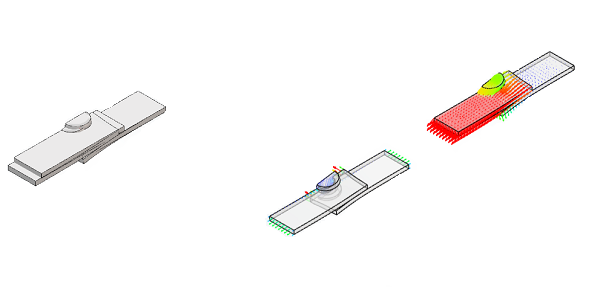About Plot Layouts | |||||
|
| ||||
By default, Physics Results Explorer displays only one plot at a time. However, there are many situations where you might want to display multiple plots at once. For example, you might want to display the same model from different angles or plot contours or symbols for several different output variables in the same analysis. You can display multiple plots by first enabling display of plot layouts from the Editor Panel, then creating a plot layout.
There are two types of plot layout: spread layouts, in which the plots are spread out along
an axis or in a plane; and superimpose layouts, in which all active plots are displayed at the
same location. Spread layouts enable you to visualize several types of data at the same time.
Superimpose layouts can be helpful when you want to examine deformation by showing an
undeformed and deformed plot in close proximity. The following image illustrates the two
different layouts: 
Above left, the two lap joints are superimposed one on top of the other to show the undeformed model and the deformed model for a selected step. Above right, the two models are laid out in a spread pattern along the X-axis, a specified distance apart. In this spread pattern example, the reaction force vectors are displayed on one lap joint, while the displacement vectors are displayed on the other lap joint.
Both spread layouts and superimpose layouts display all of the active plots within the sequences, steps, and frames that you specify. You can activate or deactivate plots from the Feature Manager.
For simulations that include multiple sequences, such as the thermal and stress sequences in a sequential thermal-stress simulation, you can include plots from every sequence in a plot layout or restrict the plot display to data from the actively selected sequence only. This control of sequence display has the following effect on spread layouts:
- If you are displaying plots from a single sequence and then change the current sequence, the active plots from the previously selected sequence are replaced with those from the newly selected sequence.
- If you start with a spread layout that uses plots from all sequences, and the current sequence is not the first one in your simulation, restricting the display down to that sequence removes plots from noncurrent sequences. All remaining plots then start the layout at the origin.